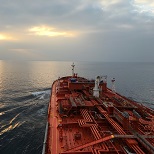Interlegal Shipping digest Q1 2023
Court finds hold reinspection should have been arranged with reasonable diligence
It is the recent case Pan Ocean Co Ltd v. Daelim Corporation (DL Lilac) [2023] EWHC 391 (Comm) in which, the arbitral tribunal found that the Charterers were in breach of an implied obligation to have the holds re-inspected without delay after a failed inspection and therefore they were not entitled to claim the vessel was off-hire for any of the 12 days between the Master calling for reinspection and when the reinspection eventually took place. However, the part of Tribunal decision was appealed in Commercial Court.
Background of case
The parties entered into a trip time charterparty on an amended NYPE 1993 form for the carriage of urea in bulk.
The Charter Party incorporated the BIMCO Hold Cleaning/Residue Disposal for Time Charter Parties clause, which states the following:
"Vessel's holds on delivery or on arrival 1st load port to be clean swept/washed down by fresh water and dried so as to receive Charterers intention cargoes in all respects free of salt, rust scale and previous cargo residue to the satisfaction of the independent surveyor.
If vessel fails to pass any holds inspection the vessel to be placed off-hire until the vessel passes the same inspection and any expense/time incurred thereby for Owners' account."
The vessel arrived at Jubail on 13 February 2017 and the hold inspection took place on 16 February 2017. Due to the presence of rust, paint flakes and cargo residue in the holds the vessel failed the inspection. On 19 February 2017, the Master notified the Charterers’ agents that the vessel had been cleaned and requested reinspection, which was only carried out when the vessel reberthed 12 days later, on 4 March 2017. The Charterers claimed the vessel was off-hire during that entire period, however the Owners disagreed and also contended that the delay was in fact due to the cargo not being ready to load.
In arbitration, the tribunal supported the Owners’ position that it should be an implied term of the charterparty that once the Master called for reinspection, the Charterers were obliged to have the vessel reinspected without delay. Keeping the vessel at anchor for 12 days was unreasonable. As it was stated nothing in the charterparty for such kind of situation, without such an obligation the Charterers would not be obliged to keep any delay to a minimum and to re-berth as soon as possible. By the end, the Owners’ claim succeeded in full.
The Commercial Court decision
On appeal the Court found that the tribunal had applied the right test for implying a term as set out by the Supreme Court in Marks & Spencer plc v. BNP Paribas [2016] AC 742. Such a test involves determining, objectively, whether the term to be implied is necessary to give business efficacy to the contract or is so obvious that it goes without saying that it should be included in the contract. The Charterers claimed that the tribunal had applied the wrong test because reasonableness was not of itself sufficient. However, the Court thought that the tribunal applied in fact the right test notwithstanding the reference to reasonableness.
The Court also disagreed with the Charterers position that the tribunal’s findings meant that the implied term placed a strict obligation on the Charterers alone in situation where the Owners’ co-operation is needed too, since there was no dispute that the charterparty required the Owners to agree to the appointment of an independent surveyor and they in fact had indicated that they would readily have done so.
However, soon it was proved that the tribunal was wrong to find that the Charterers were in breach of the implied obligation from the time when the Master called for a reinspection. The implied term required reasonable diligence to have the vessel reinspected without undue delay, but did not oblige an immediate reinspection upon the Master’s notification.
By the end, the Court found that the tribunal should have considered when the reinspection would have taken place if both parties had exercised reasonable diligence to ensure it took place without delay, rather than to found that the vessel was immediately back on-hire as soon as the Master gave notification that the hold cleaning had been completed. The issue was remitted back to the tribunal for its reconsideration in light of the Court’s decision.
Beijing Convention on the Judicial Sale of Ships
A brief background
As we know, judicial bodies in many countries are empowered to sell the vessel in order to satisfy the claim against such vessel or her owner, usually in the framework of the procedure for enforcement of lien on the vessel or maritime lien. In most jurisdictions, judicial sale of the vessel has the legal effect of transferring net title to the buyer, thereby canceling all rights and interests previously related to the vessel, including mortgages and maritime liens. However, legal effects of foreign judicial sales differ; there are even examples of jurisdictions that do not recognize legal effects of the judicial sale conducted in another state.
Beijing Convention: what are its specifications and main goal?
The Convention is expected to facilitate legal defense for buyers of ships sold in the framework of court proceedings and to protect the interests of both shipowners and creditors. First of all, it is aimed to fix uniform rules whereunder the net title acquired by the buyer on such vessel will be recognized internationally, jointly with demand on issuing a Certificate of Sale only in compliance with certain guarantees, including notice to the shipowner, creditors and other persons. In general, the judicial sale effected in one State Party should have the same effect in every other State Party.
Such guarantees should have a positive effect on the price obtained in the process of judicial sale of the vessels, for the benefit of both shipowners and creditors, including the lien holder.
However, it should be noted that the Convention applies only to legal effects of the judicial sales; therefore, in fact the rules of judicial sales of ships shall remain the prerogative of national legislation.
Does the Convention prescribe any additional rules or requitements?
Apart from the aforesaid, the Convention provides the following additional legal effects caused by launching judicial sale:
1. Mandatory exclusion of the vessel from the Ship Register or transfer of the existing registration at the buyer’s request;
2. Prohibition to arrest the vessel by claim arising from the right or interest that existed in respect of this vessel before; and
3. Granting exclusive jurisdiction to the state where the judicial sale took place, in respect of considering the appeal against such sale.
What else interesting?
The Convention also provides practical mechanisms aimed to protect rights of the parties interested in the vessel by issuing two documents: a Notice of Judicial Sale and a Certificate of Judicial Sale, jointly with launching Online Register of such documents with free access thereto for any concerned person or entity, while the International Maritime Organization (IMO) will act as a depository for such notifications and certificates.
Also, creditors of debtor vessels, in particular mortgagees, will also have more guarantees for defense of their rights.
When and under which circumstances will the Convention enter into force?
Today, the Convention has already been adopted by the UN General Assembly, so the signing ceremony is going to be held in 2023 in Beijing as soon as possible. Its further application will depend on ratification, acceptance or approval by the signatory states, as well as on its openness to joining by any non-signatory state. The Convention will enter into force 180 days after deposit of the third instrument of ratification, the document on acceptance, approval or joining thereof.
We hope that adoption of the Beijing Convention will improve the process of acquiring vessels at auctions held by the court decisions and will make it safer. Interlegal law team is always ready to provide qualified legal assistance to your business and to assist in understanding the nuances of its international regulation.
NOTICE OF CANCELLATION IN RESPECT OF WAR RISKS
The MECO Group, an international team of reputable, dedicated and knowledgeable marine insurers issued the Circular to Assureds dated 24 December 2022 containing important information regarding changes to War Risk cover.
All parties directly underwriting insurance are ultimately reliant on the support of the global reinsurance treaty market. The treaty market has determined to impose certain exclusions regarding the current Russian aggression in Ukraine, which has come into effect at midnight on 31st December 2022, the common renewal date for most reinsurance treaty programmes.
All direct underwriters, including themselves are therefore in a position where they need to give all their Assureds notice of cancellation in respect of war risks.
Other than the provisions for automatic and immediate cancellation, cover for war risks can always be cancelled with a notice period. Since 1 January 2023 the following changes terms and conditions were set out.
Territorial and conflict exclusion clause
A new clause was added that reads as follows:
Excluding all loss, damage, liability, cost or expense
- caused by or arising from or in connection with any Russia-Ukraine conflict and/or any expansion of such conflict; or
- in any area or territory or territorial waters where Russian armed forces, Russian-backed forces, and/or Russian authorities, are engaged in conflict within the territories (including territorial waters) of the Russian Federation, Belarus, the Republic of Moldova, Ukraine and any occupied / annexed regions of Ukraine including the Crimean Peninsula;
- arising from capture, seizure, arrest, detainment, confiscation, nationalisation, expropriation, deprivation or requisition for title or use, or the restraint of movement of vessels and cargo in the territories (including territorial waters) of the Russian Federation, Belarus, the Republic of Moldova, Ukraine and any occupied / annexed regions of Ukraine including the Crimean Peninsula.
Definition of war perils
The following additional perils will be defined as war perils:
- strikes, locked-out workmen, or persons taking part in labour disturbances, riots or civil commotions;
- terrorism, or any person acting maliciously or from a political motive;
- confiscation, nationalisation, expropriation, deprivation or requisition.
Automatic cancellation
A new provision was added that will cease cover immediately:
Upon the occurrence of any hostile detonation of any nuclear weapon of war, whatsoever or whensoever such detonation may occur.
Notice of cancellation
The notice of cancellation period will be reduced from seven to three days’ written notice.
Limitation under the Hague-Visby Rules where there is physical damage and economic loss
As the general practice, in case when only part of a cargo suffers some minor physical damage, then an economic loss is suffered in respect of the whole of the cargo, such as diminution in market value due to delay, a liability to pay salvors, or transhipment costs. Therefore, there is a big question arises, whether the economic loss is limited by reference to the weight of the whole cargo, just the physically damaged cargo, or is it unlimited under the Hague Visby Rules (hereinafter - “HVR”)?
Earlier, the Limnos [2008] 2 Lloyd’s Rep 166, gave an answer to above issue. It was held that the words “the goods lost or damaged” only encompass goods which are physically lost or damaged, so that where an incident causes limited physical damage but substantial consequential economic losses, the carrier can limit its liability by reference to the weight of cargo physically damaged. However, it led to many controversies, most notably that if there was very minor physical damage the entire claim might be limited to a few dollars, but if there was no physical damage at all, the economic loss claim would be unlimited.
We remind that Article IV(5)(a) of the Hague-Visby Rules limit’s the carrier’s liability for “loss or damage to or in connection with the goods” by reference to the higher of two alternative figures: 666.67 SDR per package or unit or 2 SDR per kilogram of gross weight of “the goods lost or damaged”.
In the recent important judgment handed down in case Trafigura PTE Ltd v TKK Shipping Ltd (“The Thorco Lineage”) [2023] EWHC 26 (Comm), the argument that Article IV(5)(a) of the HVR limits claims for economic loss by reference only to the weight of cargo which suffers physical damage was rejected. Rather, it was held that the limit is to be calculated by reference to the weight of cargo physically or economically damaged, including but not limited a diminution in market value, a liability to a third party such as salvors, or a requirement to transship or incurring other costs.
A brief background
The claim arose out of the grounding of the Vessel “THORCO LINEAGE” following a loss of main engine power. The Claimant was the owner of a cargo of zinc calcine which was on board of the vessel at the time of the engine failure. Salvors re-floated the vessel, but had a lien on the cargo in respect of the cargo interests’ liability for salvage remuneration, which was subsequently settled for USD 7.355 million. In addition, a small part of the cargo was physically damaged in the re-floating efforts, causing losses of about USD 300,000.
The cargo interests argued that the grounding had been caused by a breach of unseaworthiness under HVR and claimed damages in respect of their payments to salvors and the damage to the cargo, as well as on-shipment costs. Relying on The Limnos case, the carrier argued that its liability for all of the losses was limited by reference to the weight of the small quantity of cargo which had suffered physical damage.
The Carriers’ attempt to limit their liability was rejected by Judge of Commercial Court.
It was held that given that the delegates to the conventions leading to the Rules clearly intended Article IV(5)(a) to limit “economic losses which arise in connection with the goods but without physical damage” they cannot have intended to prevent there being any such a limit by requiring the presence of physical damage to the goods.
Thus, to construe the words “goods lost or damaged” as requiring the presence of physical damage to define or quantify the limit would not properly reflect the intention of the delegates to confer a right to limit in respect of liability for loss or damage or in connection with the goods.
Based on above, the Judge rejected the reasoning under The Limnos that, absent physical damage, economic losses are unlimited, and this analysis became the key to his finding that all losses must be limited by reference to the weight of the goods in connection with which the loss has been suffered.
To achieve this, it was finally held that in HVR IV(5)(a) the phrase “goods lost or damaged” means “goods lost or damaged physically or economically”.
On the facts of the case, the salvage liability and the on-shipment costs were incurred in respect of the cargo as a whole. The whole cargo was therefore “damaged” for the purposes of Article IV(5)(a), and the limit should be calculated by reference to the weight of the full cargo. The entire cargo, though largely in sound condition, had from the claimant’s perspective “a diminished value at the port of discharge to the extent of the additional expense had incurred”
Importantly, the decision eliminates many of the undesirable anomalies inherent in The Limnos analysis and to a considerable extent brings the English law approach to Article IV(5)(a) into line with commercial common sense. Finally, it can be safely said that The Thorco Lineage now represents the law, and The Limnos will slide into history.
.png) Interlegal Shipping digest Q1 20232023.04.24
Interlegal Shipping digest Q1 20232023.04.24Interlegal Shipping digest Q1 2023.pdf Court finds hold reinspection should have been arranged with reasonable diligence It is the...
.jpg)
Since the beginning of military aggression of the Russian Federation and hostilities at the territory of Ukraine, maritime industry, like al...
 Old Father Dnieper Waiting for His Ships2020.06.08
Old Father Dnieper Waiting for His Ships2020.06.08Speaking about the rivers, we can’t but remember that they cradled the first human civilisations long, long ago, that they served the main a...

Some major amendments on Turkish Port Regulation took place in the Official Gazette dated 24th September, 2019. By this article, Mehmet Dogu...
 Sanctions of Black Sea Region countries2019.02.28
Sanctions of Black Sea Region countries2019.02.28Sanctions of Ukraine Since 1995, shipping has been Interlegal principal activity. Our traditional clients are shipowners, managers, chart...

In 2016 nearly 47 thousand employees engaged in the Ukrainian sea port service market earned income equal to ca. 1,700 million USD (approxim...

According to the current regulations, since 2011 all vessels over 300 GT calling at Turkish ports or other facilities in Turkish waters, as...

On March 27, 2014 the UN General Assembly adopted a resolution 68/262, in which called upon all States, international organizations and spec...

Failure of the charterer to pay the freight or demurrage amount incurred at the port of loading is quite frequent situation in the carriage...
 Crimean Ports: Now and After2014.09.30
Crimean Ports: Now and After2014.09.30On March 27, 2014 the UN General Assembly adopted a resolution on Ukraine, which called upon States, international organizations and other i...


.png)




 Odessa, 65014, Ukraine, 1 а, Gretska St
Odessa, 65014, Ukraine, 1 а, Gretska St
